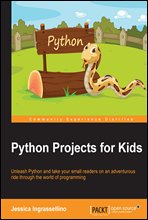
Python Projects for Kids
- 저자
- Jessica Ingrassellino 저
- 출판사
- Packt Publishing
- 출판일
- 2016-04-14
- 등록일
- 2019-12-12
- 파일포맷
- 파일크기
- 0
- 공급사
- YES24
- 지원기기
- PC PHONE TABLET 프로그램 수동설치 뷰어프로그램 설치 안내
책소개
Unleash Python and take your small readers on an adventurous ride through the world of programming
About This Book
? Learn to start using Python for some simple programming tasks such as doing easy mathematical calculations.
? Use logic and control loops to build a nice interesting game.
? Get to grips with working with data and, once you're comfortable with that, you'll be introduced to Pygame, which will help you wrap up the book with a cool game.
Who This Book Is For
This book is for kids (aged 10 and over). This is book is intended for absolute beginners who lack any knowledge of computing or programming languages and want to get started in the world of programming.
What You Will Learn
? Start fiddling with Python's variables, build functions and interact with users
? Build your own calculator using the Math Library
? Train Python to make logical decisions
? Work with moving 2D objects on-screen
? Understand the Pygame Library and build your very own game!
? Write a cool program to manage inventories in your backpack
In Detail
Kids are always the most fast-paced and enthusiastic learners, and are naturally willing to build stuff that looks like magic at the end (when it works!). Programming can be one such magic. Being able to write a program that works helps them feel they've really achieved something. Kids today are very tech-savvy and cannot wait to enter the fast-paced digital world.
Because Python is one of the most popular languages and has a syntax that is quite simple to understand, even kids are eager to use it as a stepping stone to learning programming languages.
This book will cover projects that are simple and fun, and teach kids how to write Python code that works.
The book will teach the basics of Python programming, installation, and so on and then will move on to projects. A total of three projects, with each and every step explained carefully, without any assumption of previous experience.
Style and approach
The book will take a light approach in guiding the little readers through the world of Python. The main idea is to teach by example and let the readers have as much exercises to do, so that they learn faster and can apply their own ideas to the existing examples. The book should get them thinking, by the end, on where they can go next with such a powerful tool at their disposal.
